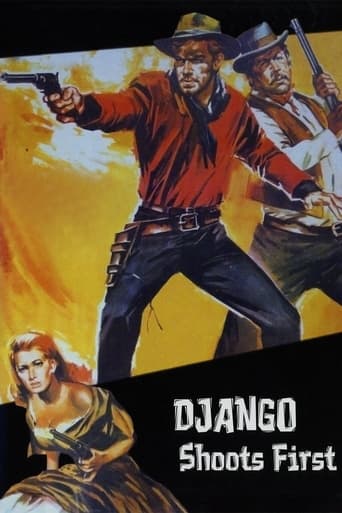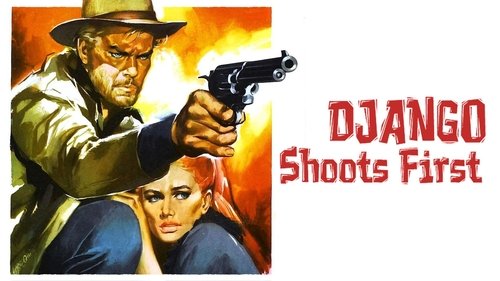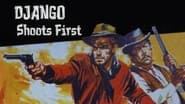zardoz-13
This atmospheric but low-budget Spaghetti western about a gunslinger who turns in his own father for the reward on his head is worth watching at least once. Mind you, I don't think it qualifies as a classic Spaghetti western. While it cannot compare with classics such as "Fistful of Dollars," For a Few Dollars More," "The Good, the Bad, and the Ugly," "Death Rides A Horse," "Django," "Navajo Joe" or the "Sabata" movies, "Django Shoots First" is adequate enough for fans to appreciate. Rugged, virile-looking Glenn Saxson cuts an appropriately heroic figure as the protagonist, while chubby Spaghetti western stalwart Fernando Sancho appears ideally cast as Garvin's loyal sidekick Gordon. Imagine a thickly-mustached Andy Devine without his wheezing laughter but armed-to-the-teeth, and you've got an adequate description of Fernando Sancho. No, Sancho isn't cast again as a ubiquitous Mexican bandit as he is in some many other continental horse operas. Gordon has his own reasons for riding with Garvin as he points out half-way through their sagebrush shenanigans: "You're one in a thousand. You're the performing kind. Why I'd walk a long way just to see your act." An elegantly attired former physician (Alberto Lupo of "Son of Cleopatra") with a cane that he wields when he makes a point joins . Shoot-outs and fistfights galore ensue. "Operation Kid Brother" director Alberto De Martino lacks the Leone touch, but he doesn't drag things out unnecessarily in this 82-minute outing. Scenarists Sandro Continenza of "For A Few Extra Dollars," Massimiliano Capriccioli of "Wanted," Tito Carpi of "Any Gun Can Play," Vincenzo Flamini of "$100,000 for Ringo," Giovanni Simonelli of "Johnny Yuma," and De Martino weave sufficient humor into the storyline to take the edge off some of the cruelty. This isn't a mean-spirited Spaghetti western. "The Five Man Army" musical director Bruno Nicolai's vibrant orchestral score enlivens the proceedings. "Massacre Time" lenser Riccardo Pallottini makes this western look better than it deserves, and the scenery looks spectacular. Genre regular George Eastman has a cameo near the end that is amusing.As the action unfolds in "Django Shoots First," Garvin (Glenn Saxson of "Go with God, Gringo") guns down Ringo, (José Manuel Martín) the black-clad, bounty hunter who shot his father for a $5-thousand reward. The ill-fated bounty hunter rides into Garvin's campsite, and Garvin guns him down. Afterward, Garvin takes the body of his father back into town and collects the loot. Garvin is surprised when he learns that his father owned half of the town with another man named Ken Cluster. The dastardly Cluster wants Garvin out of the way and dispatches his gunslingers to kill him. Eventually, Cluster frames Garvin for the murder of a bank cashier after one of his henchmen brings him the same knife that our hero uses to kill one of Cluster's henchmen during a nocturnal shoot-out in the desert. Rather than surrender to the local authorities, Garvin shoots it out with them and skedaddles out of town with a posse on his tail.The posse pursues Garvin to Cluster's ranch where Mrs. Jessica Cluster (Evelyn Stewart of "Adios Gringo") allows him to hide in her bubble bath when the sheriff storms into her house. An amusing moment occurs when Garvin parades around in a dressing gown with his gun belt strapped thwart his hips. Cluster assembles a small army of gun hands to track down Garvin. Doc warns Garvin not to trust Jessica, and he reveals that Jessica is really his wife. Jessica rides to where Ward (Guido Lollobrigida) is hiding and instructs him to deposit the loot in her name in a bank. Garvin,Doc, and Gordon prepare a little reception for Cluster's men. After our heroes ambush Cluster's men, Garvin rides after Ward. These scenes resemble something out of an American B-movie western with the hero catching up with the fleeting outlaw, bull-dogging him off his horse, and the two smashing each other with their fists. Eventually, Garvin and Gordon conceal the loot that Kluster stole from his own bank, but Jessica discovers the money, too. The ending is clever because our heroes believe that they have made off with the loot for Mexico."Django Shoots First" is an average Spaghetti western.
MartinHafer
After the Franco Nero film "Django" appeared, a lot of unscrupulous movie folks began releasing movie after movie with the name Django in the title--but they had little to do with this original film. "He Who Shoots First" (also known as "Django Shoots First") is one of these faux Django films. Now I am not sure if the film was meant to be a knockoff or if, perhaps, the folks doing the dubbing just decided on their own to make it a Django film. But, at least the leading man, Dutchman Glenn Saxson looks a bit like Nero.The film starts with Django going to see his father and finding him dead--having just been shot down by a bounty hunter. Not wanting to pass up a good opportunity, Django shoots the bounty hunter and brings his dad's corpse to town to claim the reward!! Only later does he learn that perhaps his father was NOT a criminal but was up on trumped up charges by folks intend on stealing his half interest in a local gambling hall. So, for most of the rest of the film, Django needs to fight the local scum who are trying to kill him and then claim what is rightfully his. Aside from the film having the audacity of having Django claim the bounty on his own dad(!!), I also really liked the ending as well as the music. The soundtrack was a good bit better than the average Italian western. But, apart from these things, the film had little to offer other than folks getting punched and shot. Not especially remarkable but a decent time-passer.FYI--At one point, one of the folks says "A man can't testify against his wife" but in American law this isn't exactly true. A man cannot be FORCED to testify against his wife. But, if he wants to help the prosecution by testifying against her he is surely welcome to do so.
FightingWesterner
Easygoing saddle tramp Glenn Saxson finds his father cooling off on the back of a bounty hunter's horse. Killing the bounty hunter, he takes his father's body into town to claim the reward, where he's informed by ambitious local Fernando Sancho, that his dad was actually quite wealthy and set up by his greedy business partner. The two then team up with a mystery man, carrying a switchblade stiletto cane, to take on the murderous big-shot.Django Shoots First is another colorful, fast-paced spaghetti western. There isn't much new here, but it's a pleasantly entertaining way to spend an hour and a half, with an adequate amount of action, plot-twists, and gun-wielding heavies.There's also a good score by Ennio Morricone's frequent collaborator Bruno Nicolai and a neat early cameo in the film's final scene, by Italian genre favorite George Eastman, who's minus his distinctive facial hair.
Coventry
Although no authority in the field, I've seen enough Italian westerns to know that they're ALWAYS worth peeping if only for A) the music, B) the women and C) the violence which is more gritty and relentless than in westerns produced in any other country. The legendary work of Sergio Leone and Sergio Corbucci naturally state this theory the most, but even all the obscure and low-budget genre efforts coming from this country are worth tracking down. Particularly the numberless "Django" rip-offs/unofficial sequels are immensely entertaining, like for example this exciting & surprisingly humorous adventure directed by Alberto De Martino. Glenn Saxson (a Dutch guy) takes over the title role of cult icon Franco Nero and, although not half as charismatic as Nero, he does a fairly adequate job as the indefeasible gunslinger hero who – like the title implies – always shoots first and never ever misses his target. The screenplay of this film is compelling and actually rather clever, and there isn't a single dull moment throughout the entire playtime. We meet Django as he recovers his father's dead body from a bounty hunter. Since there was the huge reward of $5.000 on his head, Django decides to collect the money himself instead of respectfully burying his father in a last resting place. Shortly after his arrival in town, however, he learns that his father wasn't a criminal at all, but a businessman framed by his former partner & bank owner Kluster. With the help of a few friends he met in the saloon, Django stays to avenge his father and claim his rightful inheritance which is about 50% of the entire town. You may anticipate all the regular ingredients of Spaghetti Westerns, like outrageous bar fights, grisly vendettas and violent ambushes, but there's also room for original sub plots in this film! One of Django's accomplices, for example, hides a mysterious secret that only gets revealed late in the film and then neatly fits in with the main storyline. Also, the film's whole climax (and particularly the comical epilogue) is very spectacular and creative. Bruno Nicolai's musical score is phenomenal as usual and both Ida Galli & Erica Blanc provide the required female beauty. "Django Shoots First" is a minor must-see for die-hard fans of this sadly extinct Italian genre.





